Hitachi, Ltd. is a Japanese multinational corporation – that is the parent company of Hitachi Group. With headquarters in Chiyoda, Tokyo the company has found itself in the middle of a technology hub. With a stake in IT and AI workings, the company is all set to change the infrastructure of the world.
Founded in 1919, by Namihei Odaira the company then produced induction motors used in copper mining. Since then the company has come a long way and now offers a wide range of commercial and residential appliances that are used all over the world. With their air conditioners taking the lead, back in the day as window air conditions, and now as sleek and simple ACs. While being at top of their game, it is no secret that some users are facing ac error codes that are unable to handle.
While there are times when a simple issue might seem like a great deal, one of these is an ac error code, especially during the summer season. The best way to deal with the situation is to note down the error code and match it using the list below. Once you have the error code you can easily work your way to the fix. To help you out we have listed down some of the most common error codes for Hitachi ACs.
Codes List
Multi-split System, Heat Pump AC
P01: Pressure ratio protection control
P02: High pressure increase protection
P03: Inverter current protection
P04: Inverter fin temperature increase protection
P05: Discharge gas temperature increase protection at the upper part of the compressor
P06: Low pressure decrease protection
P09: High pressure decrease protection
P0A: Demand current protection control
P0d: Low pressure increase protection
P11: Pressure ratio decrease retry
P12: Low pressure increase retry
P13: High pressure increase retry
P14: Constant speed compressor overcurrent retry
P15: Discharge gas temperature increase retry / Low pressure decrease retry
P16: Discharge gas super-heat decrease retry
P17: Inverter anomaly retry
P18: Abnormal Inverter voltage retry / Inverter failure retry
P26: High pressure decrease retry
Self-Diagnostic Malfunction Codes
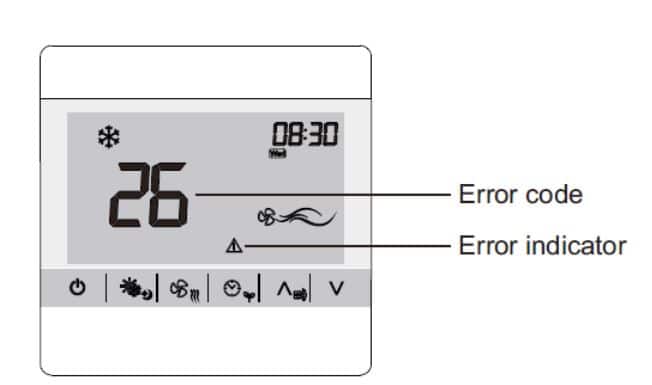
If the unit malfunctions then an error code will display on the controller as below. Error codes and Drive Error Codes can also be interrogated using the Running Parameter function on the controller. They are also displayed on the outdoor PCB.
| Alarm Codes | Cause |
|---|---|
| 01 | Tripping of Protection Device-Failure of Fan Motor, Drain Discharge, PCB, Relay. |
| 02 | Tripping of Protection Device-Activation of PSH. |
| 03 | Abnormality between Indoor (or outdoor) and Outdoor (or Indoor)-Incorrect Wiring. Failure of PCB. Tripping of Fuse. Power Supply OFF. |
| 04 | Abnormality between Inverter and Control PCB-Failure in Transmission between PCBs. |
| 05 | Abnormality of Power Source Wiring-Reverse Phase Incorrect Wiring. |
| 06 | Voltage Drop by Excessively Low or High Voltage to Outdoor Unit-Voltage Drop of Power Supply, Incorrect Wiring or Insufficient Capacity of Power Supply Wiring. |
| 07 | Decrease in Discharge Gas Superheat-Excessive Refrigerant Charge, Expansion Valve Open Lock. |
| 08 | Increase in Discharge Gas Temperature-Insufficient Refrigerant. Ref. Leakage, Clogging or Expansion Valve Close Lock. |
| 09 | Tripping of Protection Device-Failure of Fan Motor. |
| 11 | Inlet Air Thermistor-Failure of Thermistor, Sensor, Connection. |
| 12 | Outlet Air Thermistor-Failure of Thermistor, Sensor, Connection. |
| 13 | Freeze Protection Thermistor-Failure of Thermistor, Sensor, Connection. |
| 14 | Gas Piping Thermistor-Failure of Thermistor, Sensor, Connection. |
| 19 | Failure of Fan Motor-Failure of Fan Motor. |
| 21 | High Pressure Sensor-Failure of Thermistor, Sensor, Connection. |
| 22 | Outdoor Air Thermistor-Failure of Thermistor, Sensor, Connection. |
| 23 | Discharge Gas Thermistor on Comp-Failure of Thermistor, Sensor, Connection. |
| 24 | Evaporating Thermistor-Failure of Thermistor, Sensor, Connection. |
| 29 | Low Pressure Sensor-Failure of Thermistor, Sensor, Connection. |
| 30 | Incorrect Wiring Connection-Incorrect Wiring Connection between Outdoor Unit, CH Unit and Indoor Unit. |
| 31 | Incorrect Setting of Outdoor and Indoor Unit-Incorrect Setting of Capacity Code. |
| 32 | Abnormal Transmission of Other Indoor Unit-Failure of Power Supply, PCB in Other Indoor Unit. Failure of Other Indoor Unit of the Same Refrigerant Cycle. |
| 35 | Incorrect Setting in Indoor/Outdoor Unit No-Existence of the same Indoor Unit No. in the same refrigerant cycle. |
| 38 | Abnormality of Protective Circuit in Outdoor Unit-Failure of Indoor Unit PCB. Incorrect Wiring Connection to PCB in Outdoor Unit. |
| 39 | Abnormality of Running Current at Constant Compressor-Overcurrent, Melted Fuse of Failure of Current Sensor. |
| 43 | Pressure Ratio Decrease Protection Activating-Failure of Compressor, Inverter. |
| 44 | Low Pressure Increase Protection Activating-Overload to Indoor in Cooling, High Temperature of Outdoor Air in Heating Expansion Valve Open Lock. |
| 45 | High Pressure Increase Protection Activating-Overload Operation. Excessive Refrigerant Clogging of Heat Exchanger. |
| 46 | High Pressure Decrease Protection Activating-Insufficient Refrigerant. |
| 47 | Low Pressure Decrease Protection Activating-Insufficient Refrigerant. Expansion Valve Close Lock. Refrigerant Leakage. |
| 51 | Abnormality of Current Sensor for Inverter-Failure of Sensor on Inverter PCB. |
| 52 | Overcurrent Protection Activating-Overload, Overcurrent, Locked to Compressor. |
| 53 | IPM Protection Activating-Automatic Stoppage of IPM. |
| 54 | Increase in Inverter Fin Temperature-Abnormal Inverter Fin Thermistor, Abnormal Outdoor Fan. |
| 56 | Abnormality of Detection for Fan Motor Position-Abnormal Detection Circuit of Transmission. |
| 57 | Fan Controller Protection Activating-Abnormal Fan Speed. |
| 58 | Abnormality of Fan Controller-Overcurrent, Abnormal Fan Controller Fin. |
| 59 | AC Chopper Circuit Protection-Failure of FET, Power Supply, CT for Fan Motor. |
| 76 | Freeze protection stop by indoor liquid refrigerant temperature thermistor. |
| 78 | RF Communication failure. No communication for 1 hour with one or two RF receivers which are bound to the RF-Bridge. |
| EE | Compressor Protection-3 Time Occurrence of Alarm Giving Damage to Compressor within 6 hours. |
| dd | Incorrect Wiring between Indoor Units-Incorrect Wiring between Indoor Units and Remote Control Switch. |
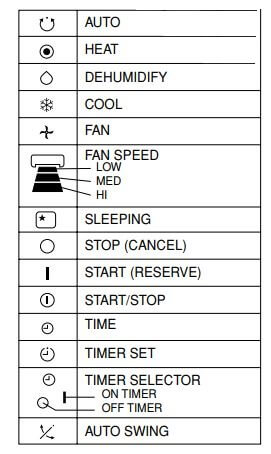
Remote Controller Alarm Codes
Regarding the retry control, the lastest retry code will be indicated unless the protection control related with the frequency control is indicated.
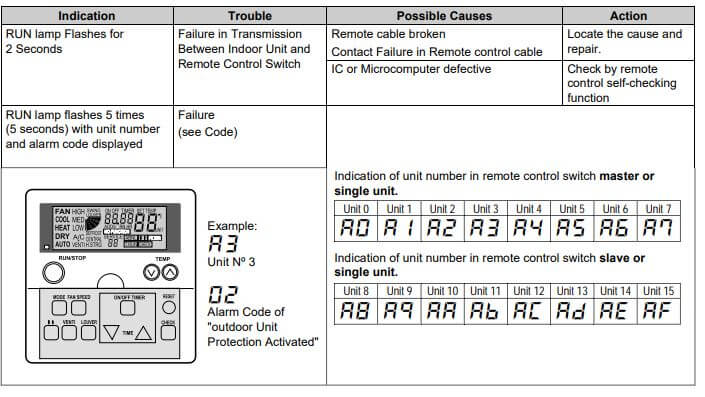
| Codes | Cause |
|---|---|
| 01 | Safety Device of the Indoor Unit is tripped (internal Thermostat, *Float Switch) |
| 02 | 1. Safety Device of the Outdoor Unit is tripped (High pressure switch, Internal Thermostat for Outdoor Fan Motor and Overcurrent Relay) 2. Safety Device of the Outdoor Unit is tripped (Overcurrent Relay, Compressor Chamber Thermostat, High Pressure Switch and Internal Thermostat for Outdoor and Indoor Fan Motor) |
| 03 | Transmission Abnormality between Indoor Unit and Outdoor Unit |
| 05 | Picking up phase Abnormality |
| 08 | Abnormality High Temperature on the Top of Compressor |
| 11 | Thermistor Abnormality for inlet Air Temperature |
| 12 | Thermistor Abnormality for outlet Air Temperature |
| 13 | Thermistor Abnormality for Freezing Temperature |
| 20 | Thermistor Abnormality for Compressor Top Temperature |
| 22 | Thermistor Abnormality for Outdoor Air Temperature |
| 24 | Thermistor Abnormality for Outdoor Evaporating Temperature (defrosting) |
| 25 | Thermistor Abnormality for Condensing Temperature |
| 32 | Transmision Abnormality between Master and Slave |
| 38 | Abnormality in the Picking up Circuit protection |
| 41 | Excessive Overload during Cooling Operation |
| 42 | Excessive Overload during Heating Operation |
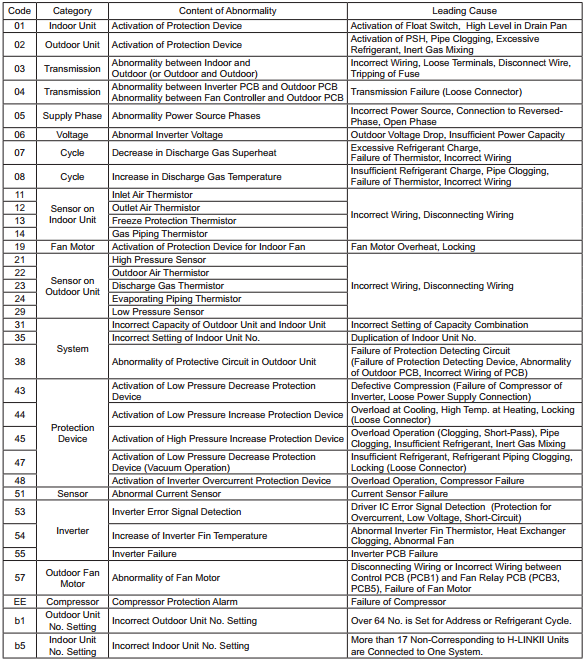
Inverter AC Codes List
| Error code | Malfunction |
|---|---|
| E0 | Water pump malfunction |
| E1 | High pressure protection of compressor |
| E2 | Indoor anti-frozen protection |
| E3 | Low pressure protection of compressor |
| E4 | Air discharge high-temperature protection of compressor |
| E5 | Overload protection of compressor or Inverter error |
| E6 | Communication malfunction |
| E8 | Indoor fan protection |
| E9 | Water flow protection |
| F0 | Malfunction of indoor environment sensor at air return vent |
| F1 | Evaporator sensor malfunction |
| F2 | Condenser sensor malfunction |
| F3 | Outdoor environment sensor malfunction |
| F4 | Malfunction of air discharge sensor |
| F5 | Malfunction of environment sensor on displayer |
| EH | Auxiliary electric heater malfunction |
| H1 | Indoor unit fault |
| H2 | Indoor ambient temperature |
| H3 | Indoor coil temperature |
| H4 | Indoor setting temperature |
| FE | Communication between main control board and wiring remote controller fault. |
| ER | Communication between main control board and display board fault. |
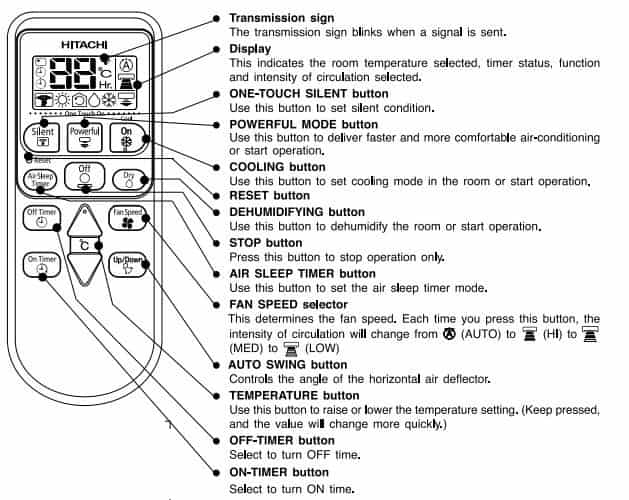
RAC Fault Codes – (Indoor Units Flashing)
| Timer Light | Cause |
|---|---|
| 1 Flash | Insufficient heating or cooling. Likely low on refrigerant. |
| 2 Flashes | Outdoor unit is in forced operation. Not a fault. |
| 3 Flashes | Indoor/Ourdoor communication error. Check interconnecting cable. |
| 4 Flashes | Outdoor unit error. Check outdoor unit. |
| 5 Flashes | Indoor fan motor rotation error. Check indoor fan motor. |
| 6 Flashes | Drain high water level alarm. Check drains and pump. |
| 7 Flashes | Drain pump in force operation. Not a fault. |
| 8 Flashes | Louver defective. Check louvers and wiring. |
| 9 Flashes | Indoor thermistor fault. Check air and pipe thermistor. |
| 10 Flashes | Fan rotation error. Check indoor fan motor. |
| 11 Flashes | High voltage genorator/Ionize fault. Check high voltage gen/Ionizer. |
| 12 Flashes | Indoor/Outdoor communication error. Check interconnecting cable. |
| 13 Flashes | EEPROM error on PCB. Check PCB. |
Troubleshooting
| Trouble | Cause |
|---|---|
| Hissing or fizzy sounds | Refrigerant flow noise in the pipe or valve sound generated when flow rate is adjusted. |
| Squeaking noise | Noise generated when the unit expands or contracts due to temperature changes. |
| Rustling noise | Noise generated with the indoor unit fan’s rpm changing such as operation start times. |
| Clicking noise | Noise of the motorized valve when the unit is switched on. |
| Perking noise | Noise of the ventilation fan sucking in air present in the drain hose and blowing out dehumidifying water that had accumulated in the condensed water collector. For details, consult your sales agent. |
| Changing operation noise | Operation noise changes due to power variations according to room temperature changes. |
| Mist emission | Mist is generated as the air within the room is suddenly cooled by conditioned air. |
| Steam emitted from the outdoor unit | Water generated during defrosting operation evaporates and steam is emitted. |
| Odors | Caused as the smells and particles of smoke, food, cosmetics, etc. present in room air become attached the unit and blown off into the room again. |
| The outdoor unit continues to operate even if operation is stopped. | Defrosting is underway (as the heating operation is stopped, the microcomputer checks frost accumulated in the indoor unit and instructs the unit to perform automatic defrosting if necessary). |
| The OPERATION lamp is blinking. | Shows preheating or defrosting operation is underway. As the protective circuit or preheat sensor operates when unit operation is stopped during preheating and then restarted, or when operation mode is switched from cooling to heating, the lamp continues to blink. |
| Does not reach the temperature setting. | Actual room temperature may deviate slightly from the remote controller’s temperature setting depending on the number of people in the room, indoor or outdoor conditions. |
Wiring Diagrams
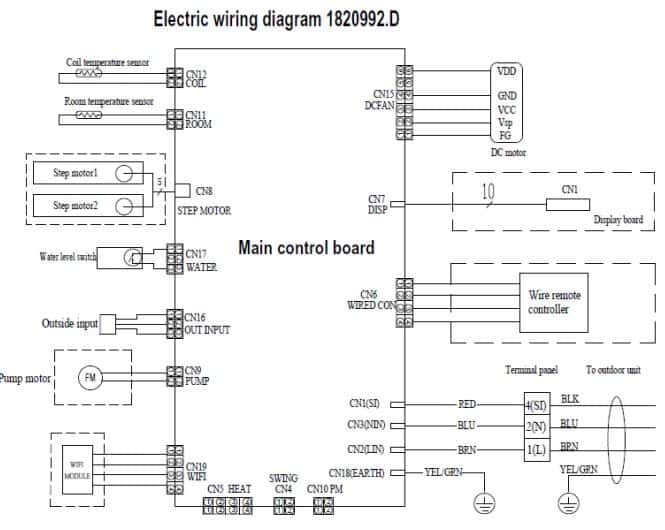
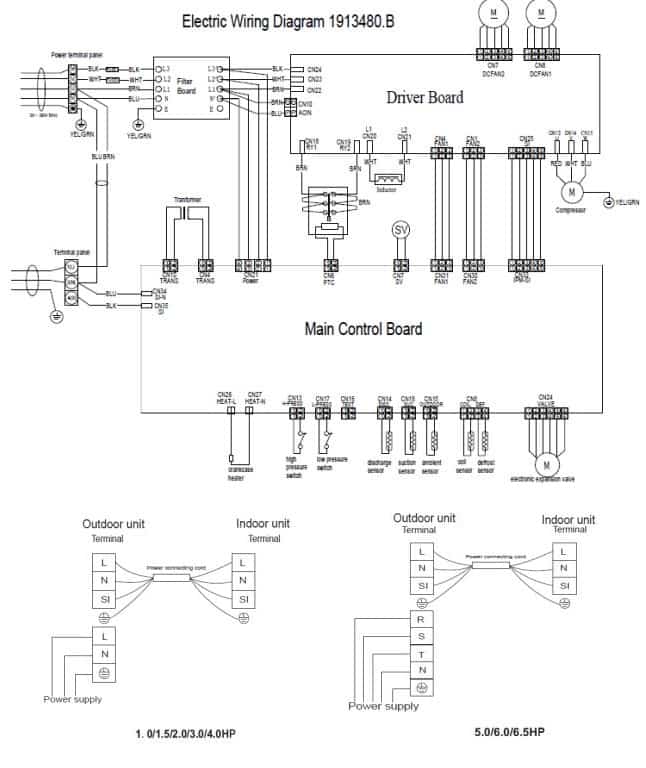
Manuals
Split System Heat Pump AC Manual
- Unionaire Air Conditioner Error Codes - December 1, 2025
- Ameristar AC Error Codes and Troubleshooting - December 1, 2025
- Rheem Pool Heat Pump Error Codes - December 1, 2025

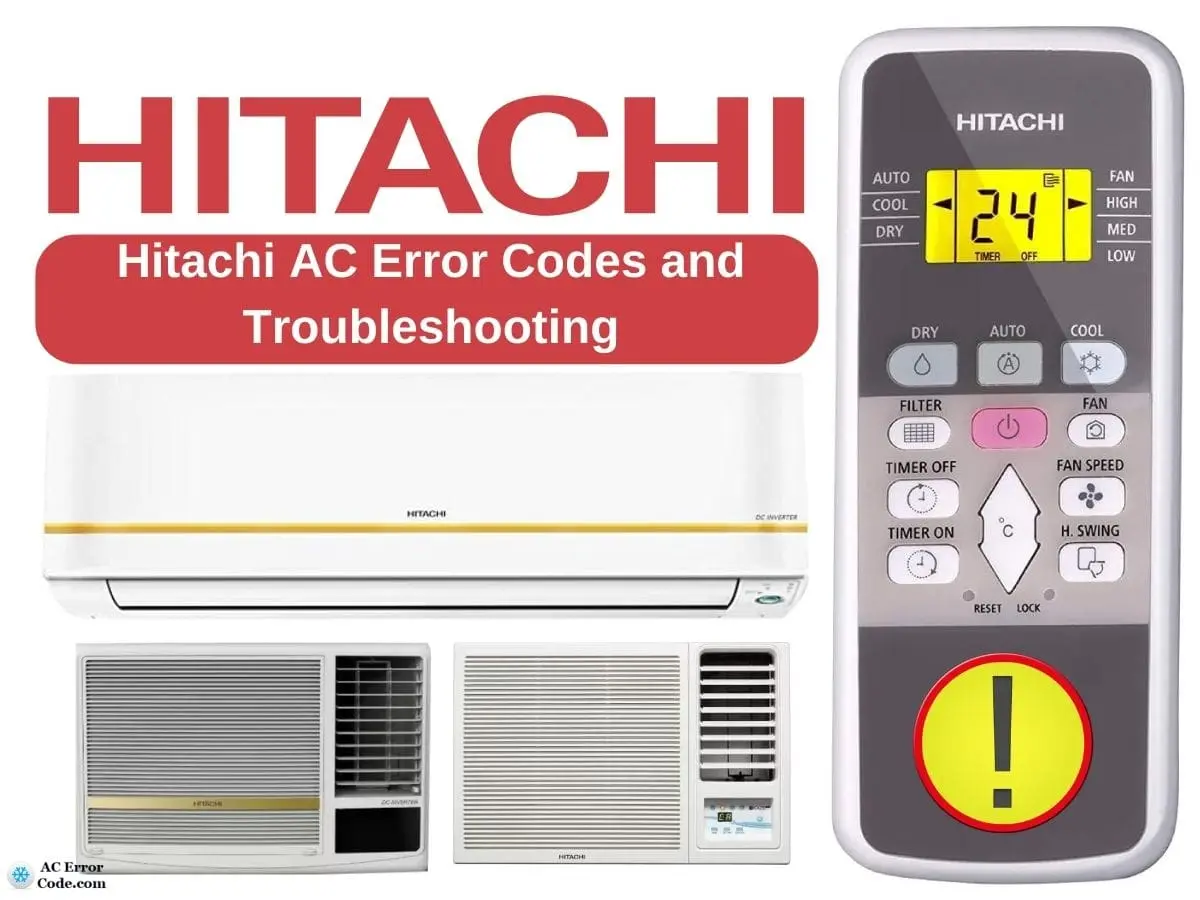
i don’t know Hitachi vrf Ecco error code?
P4 error code on Hitachi RAS/RAC 19HV split type dc inverter aircon ….outdoor unit fan running for sometime but not the compressor then eventually unit stop with P4 error on the indoor unit display…..what and where could be the problem….thanks
E10 code arise tonight, how to solve it? Thanks!
hitachi ac(16.5 ton) error sppr coming how to solve in the issues
Error 012 code, timer blinking on indoor unit.
Error 12: Outlet Air Thermistor – Failure of Thermistor, Sensor, Connection